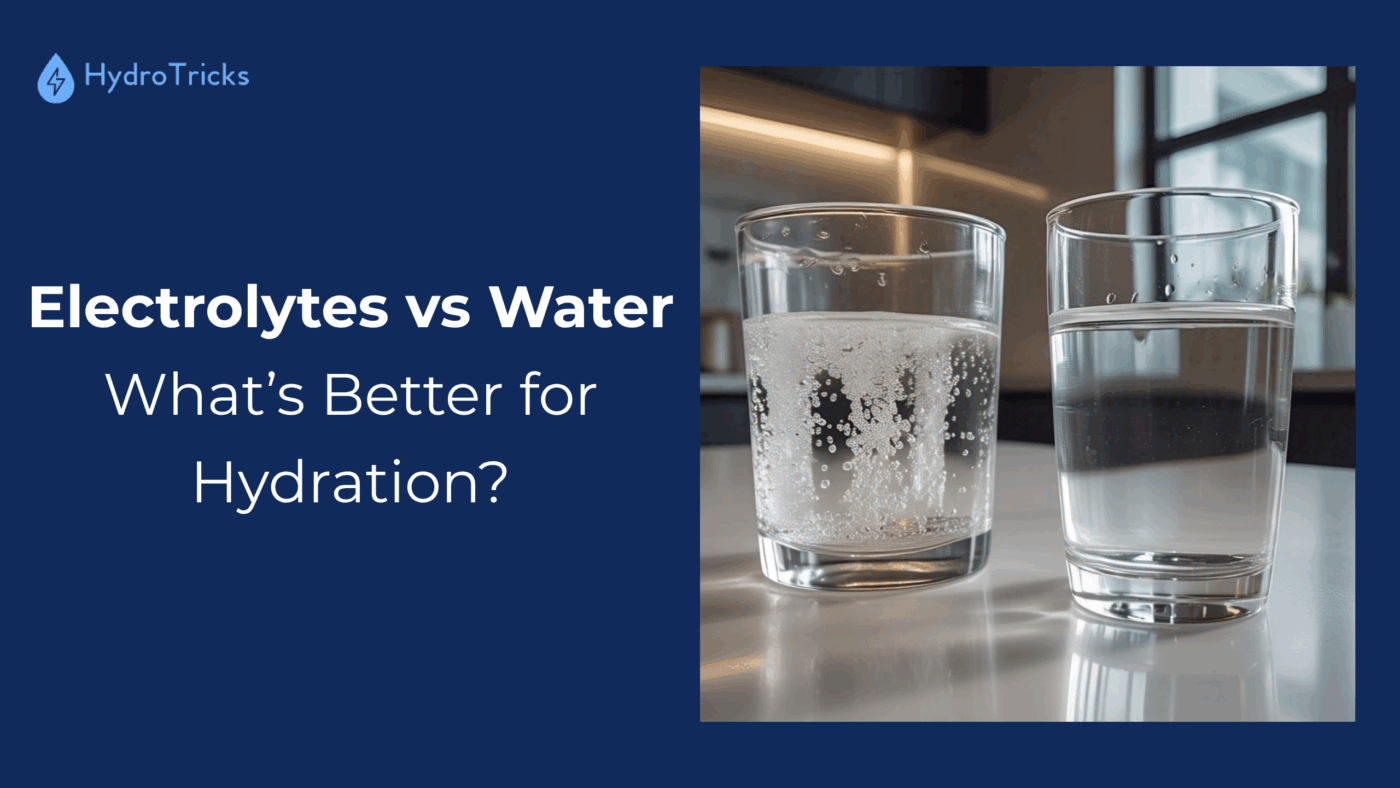Staying properly hydrated is fundamental to maintaining overall health and well-being. Hydration supports everything from regulating body temperature and transporting nutrients to keeping joints lubricated and aiding digestion. When it comes to hydration options, a common debate arises: electrolytes vs water — which one truly keeps you better hydrated? While plain water is often the go-to choice for quenching thirst, electrolyte drinks have gained popularity, promising faster and more efficient rehydration. This blog explores the differences between electrolytes vs water, their roles in the body, and when each is best suited for your hydration needs.
What Are Electrolytes and Plain Water?
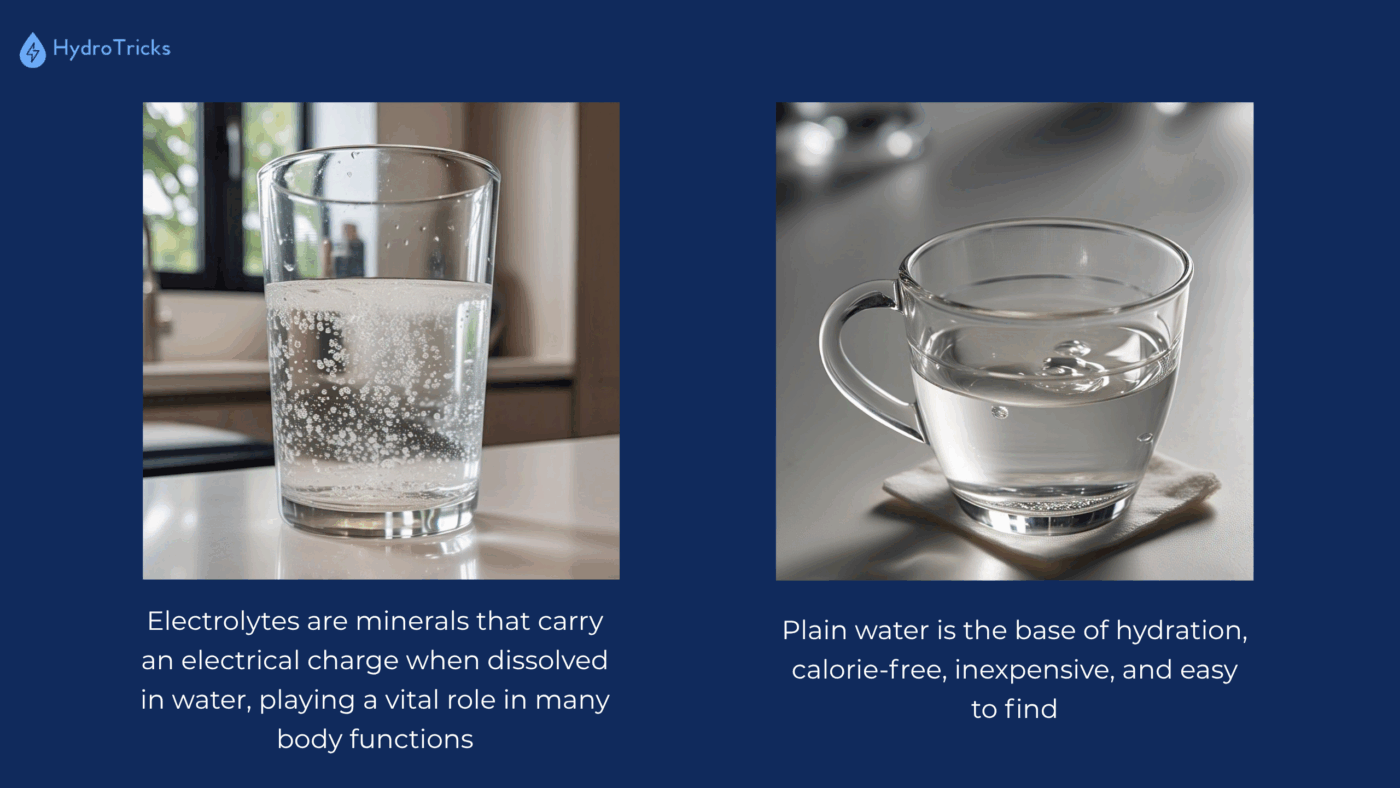
What are electrolytes? They are minerals that carry an electrical charge when dissolved in water, playing a vital role in many body functions. Common electrolytes include sodium, potassium, magnesium, calcium, chloride, phosphate, and bicarbonates. These charged minerals help regulate nerve signals, muscle contractions (including your heartbeat), and maintain fluid balance inside and outside your cells.
Plain water is the base of hydration — calorie-free, inexpensive, and easy to find. For everyday activities and light exercise, water alone usually meets your hydration needs effectively. It supports vital functions like nutrient transport, temperature regulation, and waste removal without added sugars or chemicals.
When considering electrolytes vs water, it’s important to understand that plain water hydrates by replacing lost fluids, while electrolytes restore the essential minerals lost through sweat and other processes. For example, sodium and potassium maintain fluid balance and proper muscle function, while magnesium and calcium support nerve transmission and muscle contractions.
So, what are electrolytes really doing in your body? They keep your muscles working properly, regulate nerve impulses, support energy production, and help maintain your body’s pH balance. Losing electrolytes through sweat means replenishing them can be important during intense exercise or illness.
Understanding what are electrolytes and how they differ from plain water helps you make the best choices for hydration
When Electrolytes Are Necessary

Understanding the balance between electrolytes vs water depends on context. During regular daily activities, plain water is generally sufficient for hydration. However, during intense exercise, illness, prolonged heat exposure, or fasting, electrolyte loss increases significantly through sweat or bodily fluids.
Signs of electrolyte imbalance include muscle cramps, fatigue, dizziness, irregular heartbeat, and confusion. In such cases, simply drinking water might dilute your blood’s electrolytes further, causing a condition called hyponatremia. This can be dangerous if left untreated, highlighting the importance of electrolyte replenishment during these times.
Situations such as marathon running, heavy labor in hot climates, or extended bouts of vomiting and diarrhea require not only water but a replacement of these minerals to maintain proper hydration and overall health. This is a prime example of when the choice of electrolytes vs water matters most.
Benefits of Plain Water
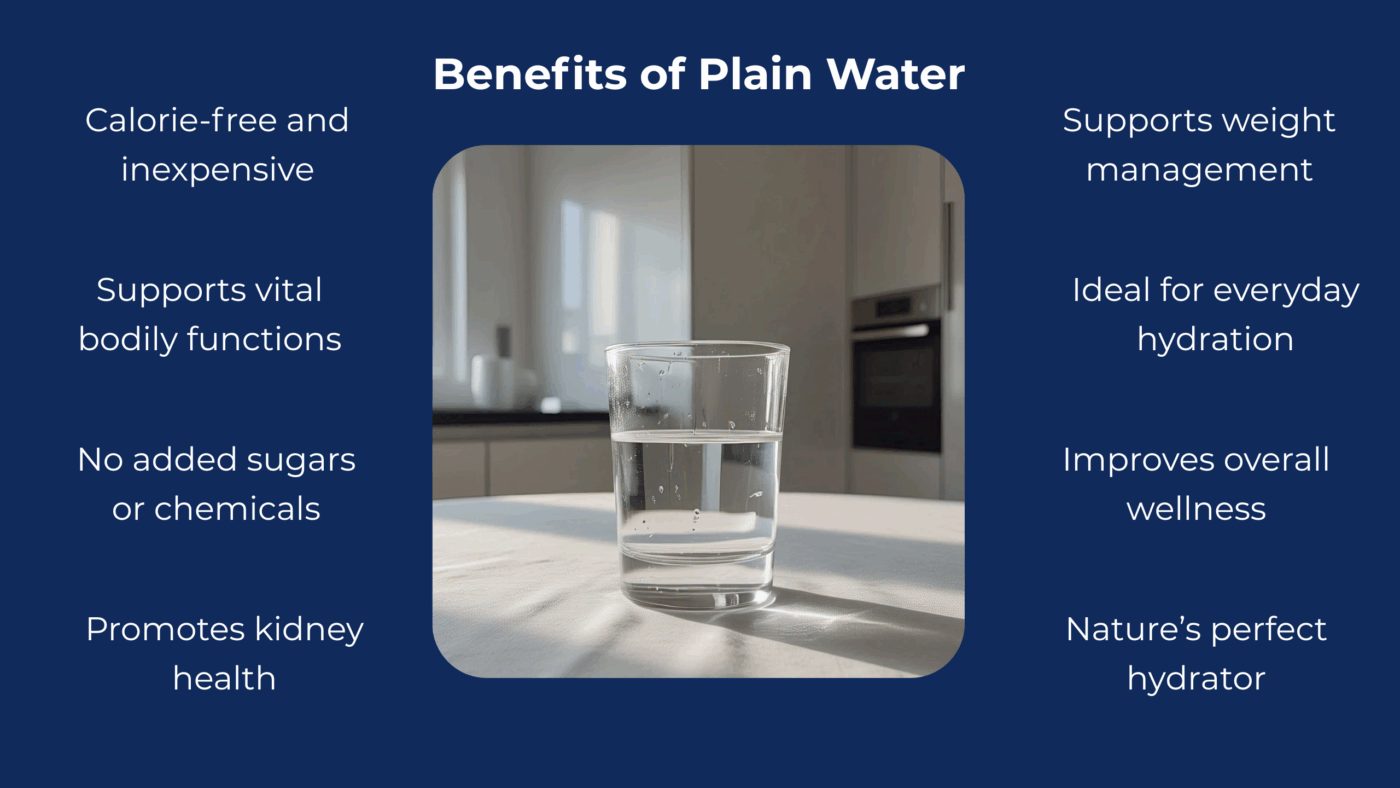
Water is the foundation of proper hydration, offering many advantages, especially for everyday use:
- Calorie-free and inexpensive: Water contains zero calories and is widely available at little to no cost.
- Supports vital bodily functions by transporting nutrients throughout the body, regulating body temperature through sweating and respiration, and aiding in waste removal via urine and sweat.
- No added sugars or chemicals: Unlike many electrolyte drinks, plain water is free from artificial ingredients, preservatives, and added sugars.
- Promotes kidney health: Helps flush toxins from the body and reduces the risk of urinary tract infections.
- Supports weight management: Drinking water instead of calorie-containing beverages can help control calorie intake and support a healthy weight.
- Ideal for everyday hydration: Perfect for low-intensity or short-duration activities, where hydration needs are moderate.
- Improves overall wellness: Staying well-hydrated with water can enhance mental clarity, boost energy levels, and improve skin health.
- Nature’s perfect hydrator: Simple, safe, and effective, plain water meets most hydration needs without any drawbacks.
When comparing electrolytes vs water, plain water remains the safest and simplest choice for daily hydration needs.
Risks of Overusing Electrolyte Drinks
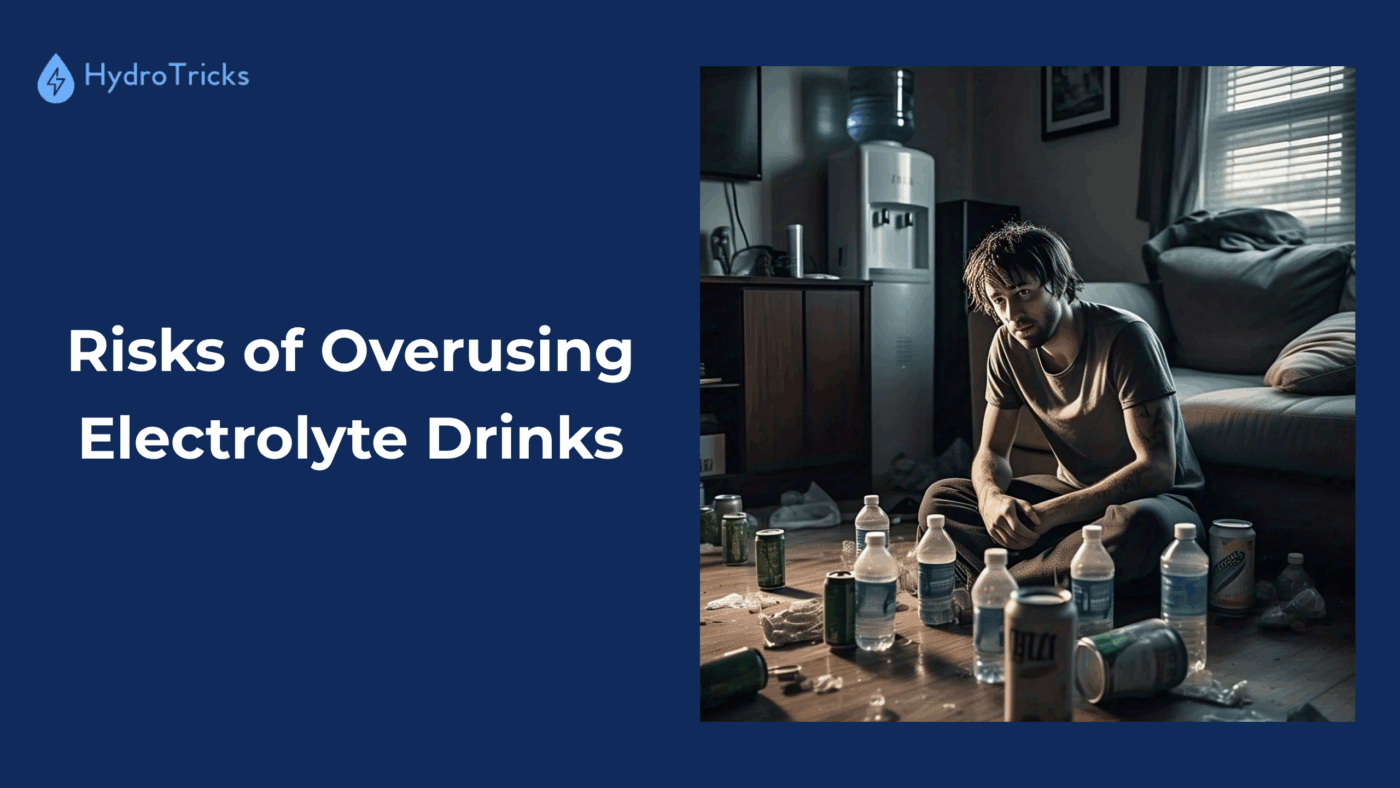
While electrolyte drinks can be beneficial, overusing them may pose some health risks. Here’s what to watch out for:
- Added sugars and calories: Many commercial electrolyte drinks contain high amounts of added sugars, which can contribute to weight gain, increased blood sugar levels, and other metabolic issues.
- Artificial ingredients: Some beverages include artificial flavors, colors, and preservatives that might negatively impact health or cause sensitivities in some people.
- Excess sodium intake: Consuming too much sodium from electrolyte drinks can lead to elevated blood pressure, water retention, and increased strain on the heart and kidneys.
- Unnecessary mineral intake for sedentary individuals: If you have a low activity level, regularly drinking electrolyte beverages can result in an excessive and unnecessary intake of minerals and calories.
- Potential for masking dehydration: Relying heavily on flavored electrolyte drinks might mask thirst signals, causing people to drink less plain water, which is essential for balanced hydration.
- Label vigilance recommended: Always check ingredient lists for unwanted additives or excessive sugar content to make informed choices.
- Natural alternatives: Options like coconut water or homemade electrolyte solutions provide minerals without added sugars or artificial ingredients, making them a healthier choice for regular hydration.
This careful consideration is vital when deciding electrolytes vs water for your hydration needs.
Best Times to Choose Each: Electrolytes vs Water
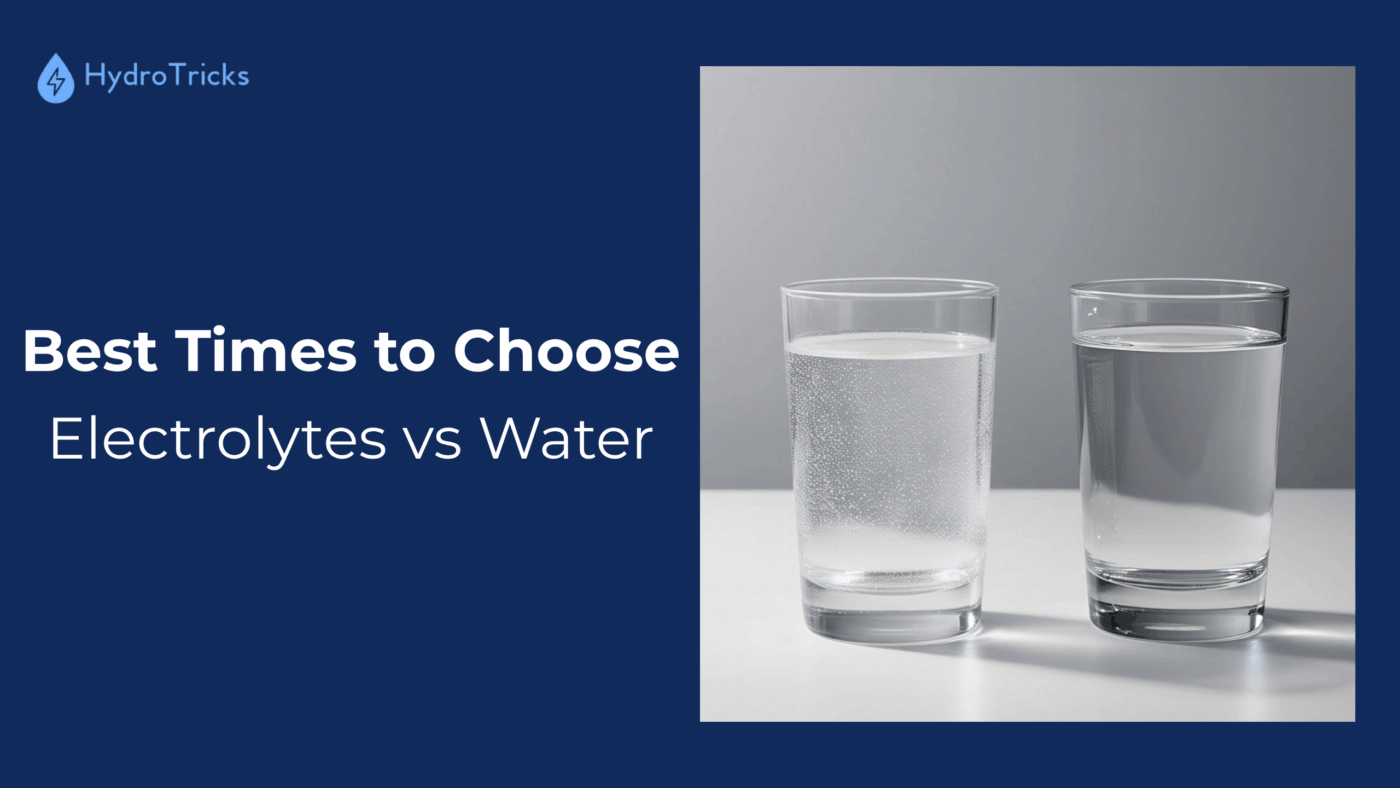
Deciding between electrolytes vs water depends on your activity level and hydration needs. Here’s a breakdown of when each is most appropriate:
When to Choose Plain Water
- Everyday hydration: Ideal for regular daily activities such as work, school, or light chores.
- Low-intensity exercise: Suitable for walking, yoga, stretching, or light gym sessions where sweat loss is minimal.
- Calorie-conscious hydration: Water contains no calories, sugars, or additives, making it the healthiest option for general hydration.
- Maintaining kidney and digestive health: Supports flushing toxins and proper digestion without any extra ingredients.
- Mild weather conditions: Perfect for hydration during moderate temperatures and low sweat loss.
When to Choose Electrolyte Drinks
- Prolonged or intense physical activity: Essential during endurance sports, heavy workouts, high-intensity interval training (HIIT), or long-distance running where significant sweat loss occurs.
- Hot and humid environments: Electrolytes help replenish minerals lost through heavy sweating to prevent dehydration symptoms.
- Illness and recovery: Helpful during vomiting, diarrhea, or fever when electrolyte balance is disrupted.
- Athletic performance support: Prevents muscle cramps, fatigue, and maintains proper muscle and nerve function during demanding activities.
- Pregnancy and breastfeeding: Supports increased fluid and mineral needs, especially with symptoms like morning sickness that may cause dehydration.
Understanding the differences in electrolytes vs water allows you to choose the right hydration method for your lifestyle and activity.
Hydrogen Water: The Future of Smart Hydration
In the ongoing discussion of electrolytes vs water, it’s worth considering hydrogen water as an innovative hydration alternative. Hydrogen water is regular water infused with molecular hydrogen, offering enhanced health benefits beyond basic hydration.
Hydrogen-infused water penetrates cells more efficiently, delivering deeper hydration. It acts as a powerful antioxidant that combats oxidative stress, a key factor in aging and chronic disease. Hydrogen water can also speed up post-workout recovery by reducing inflammation and supporting muscle repair, providing a natural energy boost without caffeine crashes. Its crisp, refreshing taste encourages consistent hydration.
Meet the HydroWata Hydrogen Water Bottle
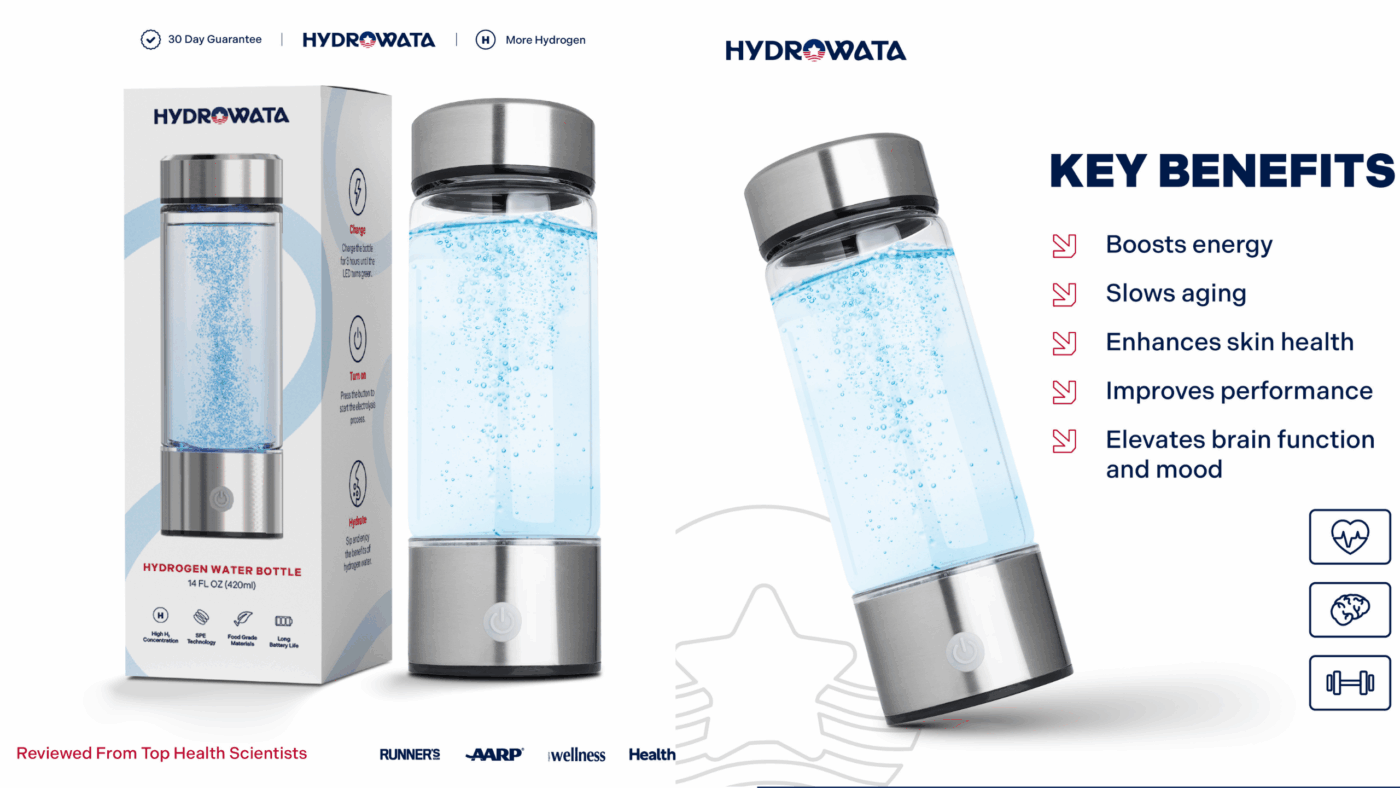
The HydroWata Hydrogen Water Bottle is designed to make hydrogen water accessible and convenient. It produces up to 1.68 parts per million (PPM) of hydrogen concentration with each cycle, delivering therapeutic doses of antioxidants. This bottle supports gut health, reduces inflammation, and promotes cognitive function.
It features smart auto shut-off, a wide-mouth opening for easy drinking and cleaning, and is made from durable, chemical-free glass. With a long-lasting rechargeable battery and advanced SPE technology, HydroWata ensures safe, pure hydrogen water free from contaminants.
In the context of electrolytes vs water, hydrogen water offers a middle ground — superior hydration with added health benefits, ideal for active lifestyles and health-conscious individuals.
Tips for Balanced Hydration
Achieving the right balance between electrolytes vs water is essential. Here are some practical tips:
- Listen to Your Body: Thirst is a good indicator. Drink water regularly, and if you’re sweating heavily, consider electrolyte replenishment.
- Choose Quality Electrolyte Sources: Opt for natural options like coconut water or homemade electrolyte drinks with minimal added sugars.
- Avoid Overhydration: Drinking too much water without electrolytes during heavy sweating can cause hyponatremia.
- Maintain a Balanced Diet: Foods rich in potassium (bananas, spinach), magnesium (nuts, seeds), and calcium (dairy, leafy greens) naturally support electrolyte balance.
- Stay Hydrated Throughout the Day: Don’t wait until you’re thirsty; sip fluids regularly.
Consider Your Environment: Hot or humid climates increase your electrolyte needs. - Limit Sugary Sports Drinks: These can contribute unnecessary calories and sugar.
Conclusion
When weighing electrolytes vs water, there’s no one-size-fits-all answer. For daily hydration needs and moderate activity, plain water is effective, accessible, and healthy. However, for intense exercise, illness, or heat exposure, replenishing electrolytes is essential to maintain balance and performance.
Hydrogen water introduces an exciting option by combining deep hydration with antioxidant benefits. The HydroWata Hydrogen Water Bottle makes it easy to enjoy these advantages wherever you go.
Ultimately, understanding your body’s needs and activity levels helps you choose wisely between electrolytes vs water. Stay mindful of your hydration sources, avoid overconsumption of sugary electrolyte drinks, and consider innovative solutions like hydrogen water for optimal health.

